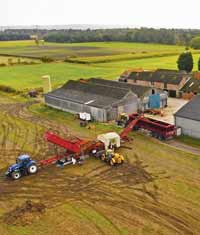Farm subsidies should go, says economist

British agriculture would be far more competitive without subsidies, and the industry should lobby the EU to eradicate the Common Agricultural Policy, according to economist Sean Rickard.
Speaking at a Business Link debate at the Royal Agricultural College on Tuesday (19 October), Prof Rickard said subsidies did more harm than good. “Subsidies raise farmers’ costs and keep the inefficient in business, making it difficult for the efficient to expand.”
Instead, money should be channelled into research and development, to enable farmers to produce more food with less impact. “We need a highly efficient, highly competitive industry that can rise to the challenges ahead.”
Prof Rickard admitted that removing subsidies would slash farm businesses by a third – with grazing livestock producers most dependent on farm support, they were likely to be hardest hit. However, as market forces came into play, and farmers got closer to their customers, the strongest would survive. “It would change the structure of the industry – not result in its demise.”
He also refuted claims that the environment would suffer. “Larger farmers spend more on conservation and are better managers.” Some public goods would still need financing, but farmers should tender to provide those goods for a competitive fee. “The core of British farming is amongst the best in the world. Have the confidence to believe in your ability to rise to the challenge, put the industry on a secure economic base, and elevate farming to an independent industry.”
But NFU head economist Tom Hind said the impact of losing a third of small farms would be vast. “If you removed agriculture from large parts of the country, which will always be uncompetitive, you will have major social consequences. Farming underpins a wide proportion of rural society.”
Talk of removing farm support was also purely hypothetical, as the CAP was likely to continue in some form or another until 2030 and beyond, he added. “Everyone wants to get to a place where they can completely depend on the market – but I live in the real world. The CAP is needed to address the failure of markets to deliver fair returns – and it is not going to go away. We need to shape it in the best interests of our farmers.”
The price of food security was a paltry 0.5% of EU Gross Domestic Product, and farming was very reliant on this public support. “Less than 50% of commercial farms in the UK would be profitable without the single payment.”
Mr Hind said the CAP was failing to deliver its targets of encouraging market focus, improving competitiveness and productivity, and called for a fairer policy framework. “The greatest fear I have is that the risk of creating dependency on environmental payments rather than increasing the competitiveness of farming.”
